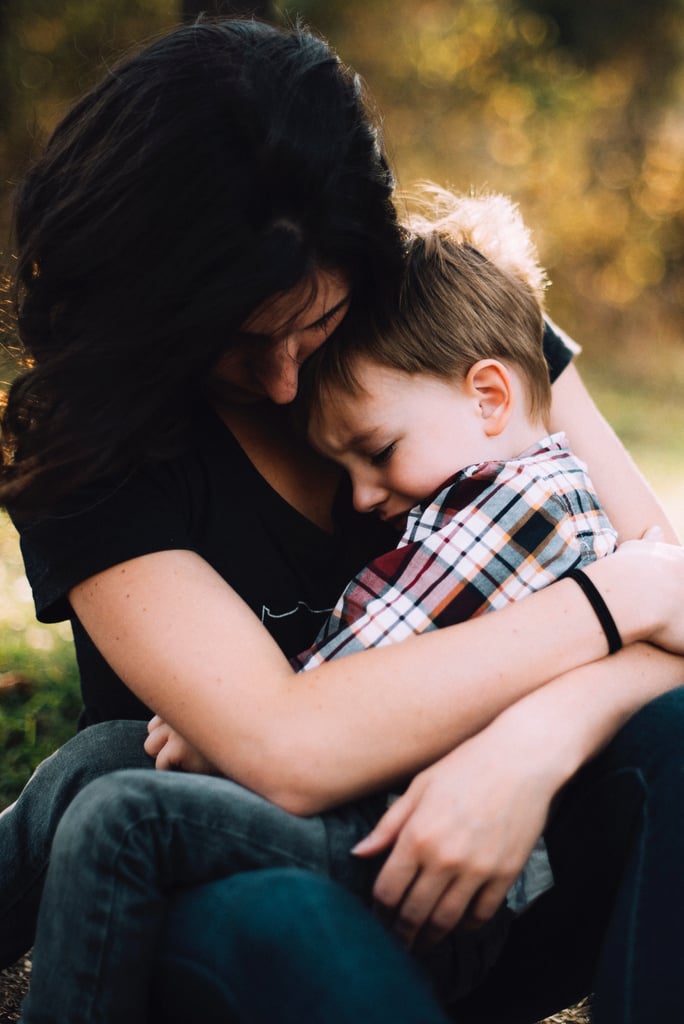Whether you are a total sucker for cheesy romantic comedies or have just experienced personal loss, deciding if you should let your kids see you cry [1] can be a tricky decision. On one hand, it's healthy to share emotions with your kids, but how young is too young to clue your children [2] into the fact that the family is going to experience a heavy loss and their grandfather will likely lose his battle with cancer? While these questions can be tough, they're important to answer.
Thankfully, we did the heavy lifting for you by asking Mary Fristad, PhD, a psychiatry and psychology professor [3] with the department of psychiatry and behavioural health at The Ohio State University Wexner Medical Centre, to weigh in. And good news: it's actually not so bad for your kids to see you cry, after all. Scroll through to see the pros, cons, and ways to talk to your kids based on their age if they see you begin to tear up.
Are there any benefits to letting your children see you cry?
Although getting upset in front of your brood may seem counterintuitive, letting your children see you cry every now and then isn't necessarily a bad thing. In fact, crying as a response to a sad or tragic event can give them some insight into human emotions starting at an early age.
"Modelling appropriate emotional responses to triggers — like crying about a tragic event — allows children to learn valuable lessons," Dr. Fristad said. "A range of emotional responses is normal. Parents are human beings too, not just providers of needs and wants for their children, so expressing emotions such as sadness does not make us weak."
What are the downsides to allowing your kid to watch you cry?
While crying in front of your children can have some benefits, it's important that moms and dads communicate why they're feeling upset and that having those feelings are completely normal.
"A young child's first reaction when seeing a parent cry might be to feel like the world is too scary or dangerous," Dr. Fristad explained. "It's important for parents to convey that feeling sad is part of being human, but that the parent is able to manage or address the situation."
Giving your child some general context can be particularly helpful in these situations. Dr. Fristad recommended saying something like: "I am very sad that Grandpa had to be hospitalized, but I am glad that we will be able to visit him as soon as he comes back home."
And while it's probably not in your kiddo's best interest to see a parent break down every single time he or she gets frustrated, as long as you explain why you're sad, there's no hard-and-fast limit in the waterworks department.
"Children need reassurance that their world is stable," Dr. Fristad said. "As long as that is accomplished, the amount a parent cries in front of their children can vary, based on the parent's temperament and life circumstances."
What's the best way to explain to my kids why I'm crying?
The amount of details and background you give a child usually has to do with how old they are. Dr. Fristad gave the hypothetical example of explaining to children that their grandfather was stopping treatment for stage 4 cancer. Here's what she recommended by age:
- Toddlers: Try to stay general about the situation for kids in this age group. "While children don't need to know all the details of adults' dilemmas and decision-making . . . the child would not need to hear all the pros and cons," Dr. Fristad explained. "It's important to convey that parents can still protect and nurture their children, even if the parent is sad. Think about saying something like: 'I am just feeling really sad right now because Grandpa's health isn't very good. I don't think he'll live much longer, so I'm glad our family can go visit him soon, and I'm even more glad that we have had so many happy times together.'"
- Kids in grade school: "Add more context and decision-making information," she said, suggesting that parents explain the thought process behind the decision by saying something along the lines of: "We've had lots of discussions about how much more treatment to pursue, but it doesn't seem to make sense to try anything else. The side effects of the chemo are so unpleasant, and the doctors don't think that even with chemo that he could live much longer."
- Tweens and teens: The older kids get, the more candid you can be with them about sad circumstances. "Parents can start to voice their own preferences about end-of-life decisions and engage their children in broader discussions," Dr. Fristad advised. They can also engage tweens and teens in conversations about how aggressive treatments might not necessarily improve their grandpa's quality of life or make him live longer.
Is it important to let your kids observe how you fix the problem after you cry?
While a death in the family is obviously harder to navigate depending on your children's age, having a fight with your spouse is entirely different. And that means you and your partner should make it a priority to show them arguments can be resolved.
"Children need to learn that challenges can be addressed," Dr. Fristad said. "So, if a parent cried after an argument, it's important for the child to see that the problem can be resolved satisfactorily."
The bottom line? Always try to give your feelings context when your kids are involved. "Parents putting into words their emotional state helps children understand that people can have a range of emotions at a varying range of intensity," Dr. Fristad said.



